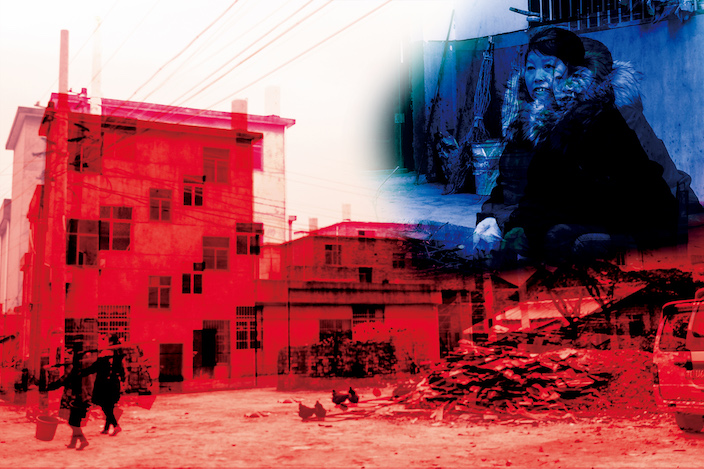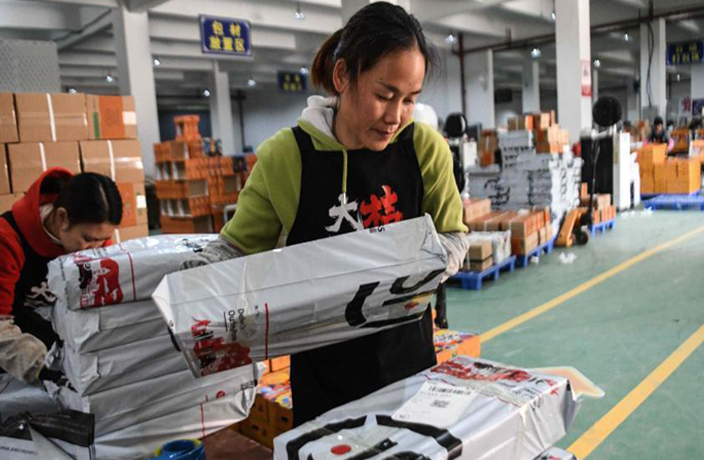This is part of our "Lonely Hearts Club: Tales of 21st Century Love in China" series. Read more about a selection of China's young singles with different views on what it means to be unmarried here and the gay couples using apps to set up sham marriages here.
When Yi Tingying and her husband had their second son 26 years ago, they felt relieved. The couple may have been forced to pay a fine for breaching the one-child policy, but at least they didn’t need to have more kids – or abortions – in the hope of a second son. Many others in their village of Fanshen, Jiangxi, were not so fortunate.
But despite the apparent security afforded by having two boys, the couple could not have foreseen the burden that was to come. When their eldest son, Wu Dong, reached marriage age they found that there were no available women in their village – or any of the surrounding ones. So by the time Wu Dong had reached his mid-20s, the search for a suitable wife was getting desperate. He’d never had a girlfriend and his parents were even more worried than he was.
“Girls in my hometown don’t like me because I am not good at talking and I am always nervous in front of them,” explains Wu Dong, who works in the neighboring province, Hunan, as a university canteen chef.
Increasingly concerned, his parents asked local matchmakers to help, but were told that it was proving difficult to find girls in the area who were not already ‘booked.’ There was, however, another option.
Although technically illegal in China, online advertisements offering mail-order solutions for single men are easy enough to find (“Pretty, young, cheap and nice Vietnamese brides,” reads one typical ad). While Chinese brides were once exported to elsewhere in the world, the flow of trade has now reversed. For a fee, an agent will arrange everything – from flights to visa paperwork – and effectively deliver a woman to customers’ doors.
Some brokers promise virgins, or offer insurance policies in case the women flee. Others send out printed catalogues and invite potential suitors to ‘viewing hotels’ in Vietnam. Here, men can meet and examine available brides, with some agencies offering tour packages that include translators and gifts for the women’s families. On Single’s Day last year, Vietnamese brides were even found for sale on Taobao for just RMB9,998, although the posts in question disappeared from the site hours after being discovered.
The mail-order phenomenon has been fueled by China’s growing gender imbalance. A combination of the one-child policy and a traditional preference for boys means that people like Wu are finding it increasingly difficult to find wives by traditional means. Although the imbalance for babies born today is less severe than at its peak in 2009 (when 121 boys were born for every 100 girls), the shortage of available women in China – especially in rural areas – has given rise to the shady mail-order bride industry.
Wu Dong was tempted by this seemingly low-risk option. He had heard that agencies could charge as much as RMB100,000, depending on the bride in question. But marrying a local woman would also come with a price tag. Even in poor areas like Fanshen, the marriage ‘gifts’ expected by the bride’s families can be prohibitively expensive. In some villages, Wu claims, the required gift may be “1.5 kilograms and one noisy” [1.5 kilograms of RMB100 notes – equal to about RMB120,000 – and a car] or “10,000 purple, 1,000 red and lots of green” [10,000 RMB5 notes, 1,000 RMB100 notes, and plenty of RMB50 notes – altogether about RMB150,000].
Although Wu’s parents are well-off compared to their neighbors, Fanshen is a poor village. But after years of failed matchmaking, the family decided that a mail-order bride might be their best chance.

Above: Wu Dong's mother (pictured outside the family home) is unable to understand her daughter-in-law's motives for fleeing. Top: Photos from Wu Dong's wedding are still kept in the family home, months after his wife fled.
In 2012, a marriage agent brought more than 10 Vietnamese girls to meet prospective customers in a neighboring village. After seeing an advertisement on a telegraph pole, Wu’s father visited the agent, who claimed to have a potential match on his books. A meeting between Wu Dong and a young woman was promptly arranged. He recalls that they both liked each other and that it was the first time he’d felt in love.
But things didn’t go to plan. Without a valid Chinese visa, Wu’s potential match was forced to fly back to Vietnam, though she left with promises of returning to Jiangxi. When she didn’t, Wu asked the agent to arrange for him to visit her. Upon arrival in Vietnam, he was informed that the woman had been blacklisted by Chinese customs for staying in the country illegally.
“I was very disappointed, but the agent said that they could introduce me to other girls,” says Wu, who would go on to stay in Vietnam for three months, most of which was spent “in the hotel watching TV or playing video games.” Eventually the agent introduced Wu to a young Vietnamese woman named An*. He recalls their first meeting with a cold indifference.
“To be honest, I did not like her,” he says. “But she said she liked me and wanted to go to China with me. I had already paid so much money – and all of the [Chinese] guys who traveled to Vietnam with me had already found someone to take home. I could have waited longer, but I’d spent too much time already. So I thought: ‘Whatever, that’s it. I will take her.’”
Wu begrudgingly completed the deal and returned home. The trip had cost him over RMB50,000. After five days, Wu’s mail-order bride arrived in Jiangxi. From when she first stepped into the Wu family home, it took just two months for the pair to wed.
"She said she liked me and wanted to go to China with me. I had already paid so much money that I thought, 'Whatever, I will take her'"
While the industry appears to be entirely controlled by brokers, it is unclear whether brides like An are the victims of people-trafficking. Research by the International Organization for Migration (IOM), an intergovernmental organization, describes marriage migration as a “significant factor” in human trafficking in Vietnam. But many women are also believed to consent to the arrangements. The brides, who are often poor or otherwise vulnerable, may be attracted by economic incentives, with mail-order marriages helping them support their families at home, or providing the chance for a better life abroad.
Unsurprisingly, An and Wu’s union proved difficult. The couple did not communicate much – Wu speaks no Vietnamese and his wife’s Chinese was only marginally better. He says that they fought a lot, often over small things, like who would sleep on the left side of the bed. Wu describes his wife with disdain: “She was very lazy… she was never happy. If I didn’t do whatever she wanted she would grow angrier and angrier. My parents treated her like a treasure. She drank a lot of coffee, so my father drove his motorbike into town to buy the kind of coffee she wanted.”
Despite the acrimony, An soon became pregnant. Yi Tingying says that she was delighted by the news, and that the family visited the hospital together for a check-up. Yet that same afternoon, An disappeared. The only trace she left was her bicycle, which stood abandoned in front of the village market. Wu Dong and his parents remain confused by her disappearance.
“We are not rich, but we are not poorer than any other family here,” his mother protests.
On the second floor of the family house, where the couple’s bedroom was located, there remains a pile of framed wedding pictures. The photos were taken down from the wall after An fled, and they now sit in the corner covered by a cloth.
“I wanted to destroy them, but my son says: ‘We paid money so why not keep them?’” Wu’s father explains. “I just don’t look at them.”
Despite their collective embarrassment, the Wu family is willing to speak about the experience. Not all are so open. We are introduced to another family whose son married a Vietnamese bride, but the man’s mother is unhappy about our visit, keeping the woman from us and saying: “She has us, she has her children, she is happy and content.”
There are no reliable estimates for the number of mail-order brides entering China. In 2014, an IOM report found that over 18,000 Vietnamese citizens migrate to get married every year, worldwide. As well as China, the industry is known to supply brides to bachelors across Asia, with South Korea also a common destination.
While it is difficult to know what proportion of these 18,000 marriages result from commercial arrangements, the report claims that “a significant number” of unions take place through illegal brokers. In some areas of Vietnam, less than 20 percent of marriages between local women and foreigners were found to be properly registered.
Reports of Vietnamese brides fleeing their Chinese husbands – often in groups – are becoming commonplace. The phenomenon was thrust into the media spotlight in November 2014 when it was reported that over 100 Vietnamese women – all of whom had married men in Handan, Hebei – fled simultaneously. The marriage broker who had brought them to the country also disappeared.
“I see the photos that she posts with another man on WeChat,” says Wu. “But I heard the life in Guangxi is not as good as here.”
Like Wu, the men expressed shock at being abandoned. But unlike most jilted husbands, Wu was able to track down information about his wife’s whereabouts. Another Vietnamese woman in the area claims that An ran away to Guangxi, where she has already given birth to a baby girl and may have already remarried.
“I see the photos that she posts with another man on WeChat,” says Wu. “But I heard the life in Guangxi is not as good as here.”
He pressed the local woman for further information, but her mother-in-law now forbids her from talking to An.
“Our daughter-in-law is different from theirs – she is quiet, and the good type of wife,” she tells us when we visit, before turning toward Wu’s father. “I think you should just forget [An]. What kind of woman is she! Find another one!”
For Wu, the sense of loss is compounded by the existence of (who they presume is) his daughter. He worries about the child’s wellbeing. But at the same time, he crudely admits that his chances of finding a new wife would be reduced if he was accompanied by a young child.
The 26-year-old now finds himself back among the ranks of China’s single rural men. While it is hoped that the relaxation of the one-child policy and growing economic freedom for women will slowly reverse the trend, demand for Vietnamese brides looks unlikely to abate in the near future. (Vietnam is also struggling with its own gender imbalance – in northern areas of the country there are almost 125 males born for every 100 females.)
Wu’s main concern now is finding another partner. Although he is still connected to his estranged wife via WeChat, they have not spoken since she left and he has given up hope of a reunion. The experience, he says, has put him off the idea of marrying another foreigner.
“If I find a girlfriend, I will be more careful before getting married,” he reflects. “And once I get married, I will cherish the marriage more. My plan is to try my luck on one of those online blind-date websites.”
* Some names and identifying details have been changed to protect the privacy of individuals.






















0 User Comments